大学英语六级听力常见的题型
六级听力题型种类
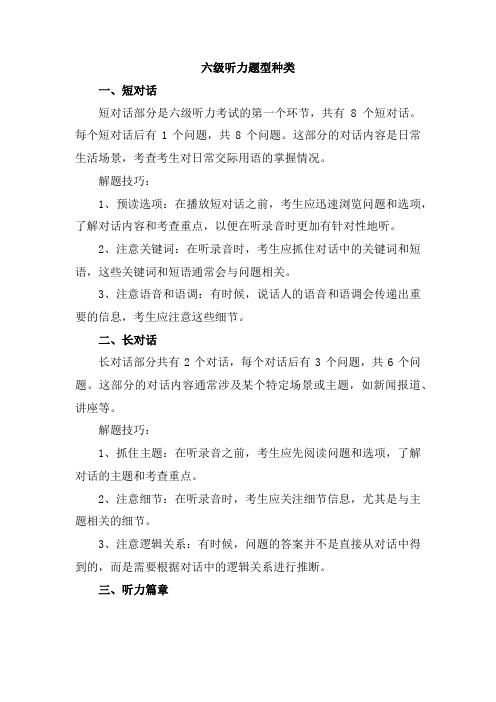
六级听力题型种类一、短对话短对话部分是六级听力考试的第一个环节,共有8个短对话。
每个短对话后有1个问题,共8个问题。
这部分的对话内容是日常生活场景,考查考生对日常交际用语的掌握情况。
解题技巧:1、预读选项:在播放短对话之前,考生应迅速浏览问题和选项,了解对话内容和考查重点,以便在听录音时更加有针对性地听。
2、注意关键词:在听录音时,考生应抓住对话中的关键词和短语,这些关键词和短语通常会与问题相关。
3、注意语音和语调:有时候,说话人的语音和语调会传递出重要的信息,考生应注意这些细节。
二、长对话长对话部分共有2个对话,每个对话后有3个问题,共6个问题。
这部分的对话内容通常涉及某个特定场景或主题,如新闻报道、讲座等。
解题技巧:1、抓住主题:在听录音之前,考生应先阅读问题和选项,了解对话的主题和考查重点。
2、注意细节:在听录音时,考生应关注细节信息,尤其是与主题相关的细节。
3、注意逻辑关系:有时候,问题的答案并不是直接从对话中得到的,而是需要根据对话中的逻辑关系进行推断。
三、听力篇章听力篇章部分共有3篇短文,每篇短文后有3个问题,共9个问题。
这部分的短文内容涉及社会、文化、科技等各个领域,难度较高。
解题技巧:1、阅读选项:在播放短文之前,考生应快速浏览问题和选项,了解短文的主题和考查重点。
2、注意关键词:在听录音时,考生应抓住文章中的关键词和短语,这些关键词和短语通常会与问题相关。
3、注意语调和语气:有时候,说话人的语调和语气会传递出重要的信息,考生应注意这些细节。
4、注意上下文:有时候,问题的答案需要在上下文中寻找线索,考生应注意文章中的逻辑关系和细节信息。
四、讲座/讲话讲座/讲话部分是一个较长的录音片段,通常是一位教授或专业人士就某个特定主题进行讲解或发表演讲。
这部分的录音内容通常较为正式和专业。
解题技巧:1、抓住主题:在听录音之前,考生应先阅读问题和选项,了解讲座/讲话的主题和考查重点。
2、注意细节:在听录音时,考生应关注细节信息,尤其是与主题相关的细节。
大学英语四、六级考试听力部分题型简述
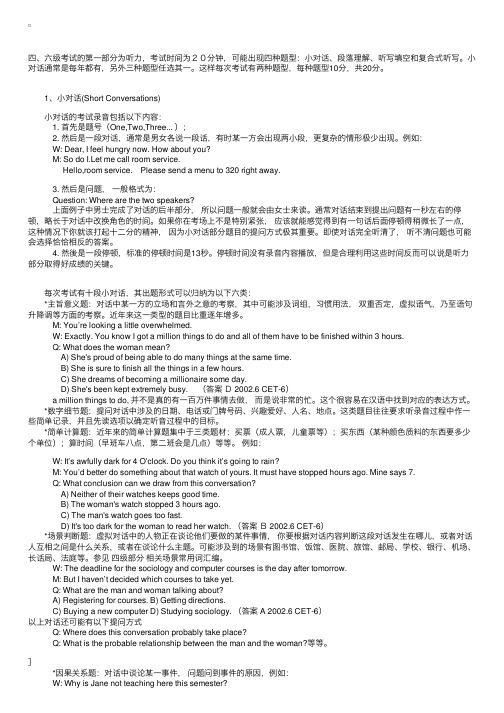
四、六级考试的第⼀部分为听⼒,考试时间为20分钟,可能出现四种题型:⼩对话、段落理解、听写填空和复合式听写。
⼩对话通常是每年都有,另外三种题型任选其⼀。
这样每次考试有两种题型,每种题型10分,共20分。
1、⼩对话(Short Conversations) ⼩对话的考试录⾳包括以下内容: 1. ⾸先是题号(One,Two,Three... ); 2. 然后是⼀段对话,通常是男⼥各说⼀段话,有时某⼀⽅会出现两⼩段,更复杂的情形极少出现。
例如: W: Dear, I feel hungry now. How about you? M: So do I.Let me call room service. Hello,room service. Please send a menu to 320 right away. 3. 然后是问题,⼀般格式为: Question: Where are the two speakers? 上⾯例⼦中男⼠完成了对话的后半部分,所以问题⼀般就会由⼥⼠来读。
通常对话结束到提出问题有⼀秒左右的停顿,略长于对话中改换⾓⾊的时间。
如果你在考场上不是特别紧张,应该就能感觉得到有⼀句话后⾯停顿得稍微长了⼀点,这种情况下你就该打起⼗⼆分的精神,因为⼩对话部分题⽬的提问⽅式极其重要。
即使对话完全听清了,听不清问题也可能会选择恰恰相反的答案。
4. 然後是⼀段停顿,标准的停顿时间是13秒。
停顿时间没有录⾳内容播放,但是合理利⽤这些时间反⽽可以说是听⼒部分取得好成绩的关键。
每次考试有⼗段⼩对话,其出题形式可以归纳为以下六类: *主旨意义题:对话中某⼀⽅的⽴场和⾔外之意的考察,其中可能涉及词组,习惯⽤法,双重否定,虚拟语⽓,乃⾄语句升降调等⽅⾯的考察。
近年来这⼀类型的题⽬⽐重逐年增多。
M: You’re looking a little overwhelmed. W: Exactly. You know I got a million things to do and all of them have to be finished within 3 hours. Q: What does the woman mean? A) She's proud of being able to do many things at the same time. B) She is sure to finish all the things in a few hours. C) She dreams of becoming a millionaire some day. D) She's been kept extremely busy. (答案D 2002.6 CET-6) a million things to do, 并不是真的有⼀百万件事情去做,⽽是说⾮常的忙。
英语6级听力原题

英语6级听力原题英语6级听力原题如下:Section A 长对话Q1: What do we learn about the man from the conversation?A) He will tell the management how he really feels.B)He will meet his new manager in two weeks.C) He is going to attend a job interview.D) He is going to leave his present job.Q2: What does the woman think of the information gained from an exit interview?A) It should be kept private.B) It should be carefully analyzed.C) It can be quite useful to senior managers.D)It can improve interviewees' job prospects.Q3: Why does the man want to rethink what he will say in the coming exit interview?A)It may leave a negative impression on the interviewer.B)It may adversely affect his future career prospects.C)It may displease his immediate superiors.D) It may do harm to his fellow employees.Q4: What does the man think he had better do?A)Prepare a comprehensive exit report.B)Do some practice for the exit interview.C)Network with his close friends to find a better employer.D)Pour out his frustrations on a rate-your-employer website.Q5: What does the man want Jane Foster to talk about?A) Her unsuccessful journeyB)Her month-long expeditionC)Her latest documentaryD)Her career as a botanistQ6: Why does the woman describe her experience as far from glamorous?A)She had to live like a vegetarianB)She was caught in a hurricane.C) She had to endure many hardshipsD) She suffered from water shortageQ7: Why did the woman and those who went with her end their trip halfway?A)A hurricane was comingB)A flood was approachingC)They had no more food in the canoe.D) They could no longer bear the humidityQ8: What does the woman think of the journey?A) It was memorableB)It was unbearableC) It was uneventfulD) It was fruitfulSection B 听力短文Q9: What does the passage say about the use of jargon terms by experts?A) It diminishes laymen's interest in scienceB) It ensures the accuracy of their argumentsC) It makes their expressions more explicit.D) It hurts laymen's dignity and self-esteem.Q10: What do researchers find about people reading scientific articles containing jargon terms?A) They can learn to communicate with scientistsB)They tend to disbelieve the actual scienceC)They feel great respect towards scientistsD)They will see the complexity of scienceQ11: What does Schulman suggest scientists do when communicating with the general public?A) Find appropriate topicsB)Stimulate their interestC) Explain all the jargon termsD)Do away with jargon termsQ12: What did Texas businessmen Patio Higgins believe?A) The local gassy hill might start a huge fireB) There was oil leakage along the Gulf CoastC) The erupting gas might endanger local childrenD) There were oil deposits below a local gassy hillQ13: What prevented Higgins’workers from digging a proper hole to get the oil?A) The massive gas undergroundB)Their lack of the needed skillC)The sand under the hillD)Their lack of suitable toolsQ14: What does the passage say about Captain Lucas' drilling method?A) It rendered many oil workers joblessB)It was not as effective as he claimedC) It gave birth to the oil drilling industryD)It was not popularized until years laterQ15: What do we learn about Texas's oil industry boom?A)It radically transformed the state's economyB) It resulted in an oil surplus all over the worldC) It totally destroyed the state's rural landscapeD)It ruined the state's cotton and beef industriesSection C 讲座Q16:What is a primary cause of employee dissatisfaction according to recent research?A)Unsuitable jobsB)Bad managersC) Insufficient motivationD)Tough regulationsQ17:What is one of the causes for poor management practices?A) Ineffective trainingB)Toxic company cultureC) Lack of regular evaluationD)Overburdening of managersQ18:What do we learn about the study on job dissatisfaction?A) It collected feedback from both employers and employeesB)It was conducted from frontline managers' point of viewC)It provided meaningful clues to solving the problemD)It was based only on the perspective of employeesQ19:What does the passage say about the mining industry in Western Australia?A) It is seeing an automation revolutionB) It is bringing prosperity to the regionC)It is yielding an unprecedented profitD) It is expanding at an accelerating speedQ20:What is the impact of the digitization of the mining industry?A) It exhausts resources soonerB)It creates a lot of new JobsC)It causes conflicts between employers and employeesD) It calls for the retraining of unskilled mining workersQ21:What is the attitude of workers' union towards the introduction of new technology?A) They welcome it with open armsB)They will wait to see its effectC)They are strongly opposed to itD) They accept it with reservationsQ22:What does the speaker say about traffic accidents in Thailand?A)Their cost to the nation’s economy is incalculable.B)They kill more people than any infectious disease.C) Their annual death rate is about twice that of the global average.D)They have experienced a gradual decline since the year of 2017.Q23:What do we learn from an American institutes statistics regarding road deaths?A)They show a difference between rich and poor nations.B)They don’t reflect the changes in individual countries.C)They rise and fall from year to year.D)They are not as reliable as claimed.Q24:What is said about middle income countries?A)Many of them have increasing numbers of cars on the road.B)Many of them are following the example set by Thailand.C) Many of them have seen a decline in road-death rates.D) Many of them are investing heavily in infrastructure.Q25:What else could be done to reduce fatal road accidents in addition to safer roads?A) Foster better driving behavior.B)Provide better training for drivers.C)Abolish all outdated traffic rules.D) Impose heavier penalties on speeding.。
英语六级真题听力题型

英语六级真题听力题型英语六级真题听力题型复习历年大学生英语六级听力,对于备考的同学来说是重要的步骤。
下面是店铺给大家整理的'大学生英语六级听力的相关知识,供大家参阅!大学生英语六级听力111. A) Surfing the net. B) Watching a talk show.C) Packing a birthday gift. D) Shopping at a jewelry store.30. A) Women. B) Prisoners. C) Manual workers. D) School age children.31. A) He taught his students how to pronounce the letters first.B) He matched the letters with the sounds familiar to the learners.C) He showed the learners how to combine the letters into simple words.D) He divided the letters into groups according to the way they are written.32. A) It Can help people to become literate within a short time.B) It was originally designed for teaching the English language.C) It enables the learners to master a language within three months.D) It is effective in teaching any alphabetical language to Brazilians. Passage Three33. A) The crop’s blooming period is delayed. B) The roots of crops are cut off.C) The topsoil is seriously damaged. D)The growth of weedsis accelerated.34. A) It’s a new way of applying chemical fertilizer.B) It’s an improved method of harvesting crops.C) It’s a creative technique for saving labor.D) It’s a farming process limiting the use of ploughs.35. A) In areas with few weeds and unwanted plants.B) In areas with a severe shortage of water.C) In areas lacking in chemical fertilizer.D) In areas dependent on imported food.个人将其中长对话改成了单词听写Adults are getting smarter about how smart babies are. Not long ago, researcherslearned that 4-day-oldscould understand (36)____ and subtraction. Now, British research(37) ____Graham Schafer has discovered that infants can learn words for uncommon things long before they can speak. He found that 9-month-old infants could be taught, through repeated show-and-tell, to (38) _______the names of objects that were foreign to them, a result that(39)________in some ways the received (40)______that, apart from learning to (41)______things common to their daily lives, child ren don’t begin to build vocabulary until well into their second year. ―It’s no (42)______that children learn words, but the words they tend to know are words linked to (43)_____ situations in the home,‖ explains Schafer. ‖This is the first that we can cho ose what words the children will learn and that they can respond to them with an unfamiliar voice giving instructions in an unfamiliar setting.‖Figuring out how humans acquire language may shed light on why some children learn to read and write later than others, Schafer says, and could lead to better treatments fordevelopmental problems. What’s more, the study of language offers direct insight into how humans learn . ―Language is a test case for human cognitive development,‖ says Schafer. But parents eager to teach their infants should take note: Even without beingwithin a few moths. ―This is not about advancing development,‖ he says. ―It’s just about what children can do at an earlier age than what educators have often thought.‖大学生英语六级听力211 A) Dr. Smi th’s waiting room isn’t tidy.B) Dr. Smith enjoys reading magazines.C) Dr. Smith has left a good impression on her.D) Dr. Smith may not be a good choice.12. A) The man will rent the apartment when it is available.B) The man made a bargain with the landlady over the rent.C) The man insists on having a look at the apartment first.D) The man is not fully satisfied with the apartment.13. A) Packing up to go abroad.B) Brushing up on her English.C) Drawing up a plan for her English course.D) Applying for a visa to the United States.14. A) He is anxious to find a cure for his high blood pressure.B) He doesn’t think high blood pressure is a problem for him.C) He was not aware of his illness until diagnosed with it.D) He did not take the symptoms of his illness seriously.15. A) To investigate the causes of AIDS.B) To raise money for AIDS patients.C) To rally support for AIDS victims in Africa.D) To draw attention to the spread of AIDS in Asia.16. A) It has a very long history.B) It is a private institution.C) It was founded by Thomas Jefferson.D) It stresses the comprehensive study of nature.17. A) They can’t fit into the machine.B) They have not been delivered yet.C) They were sent to the wrong address.D) They were found to be of the wrong type.18. A) The food served in the cafeteria usually lacks variety.B) The cafeteria sometimes provides rare food for the students.C) The students find the service in the cafeteria satisfactory.D) The cafeteria tries hard to cater to the students’ needs.19 .A) He picked up some apples in his yard.B) He cut some branches off the apple tree.C) He quarreled with his neighbor over the fence.D) He cleaned up all the garbage in the woman’s yard.20. A) Trim the apple trees in her yard.B) Pick up the apples that fell in her yard.C) Take the garbage to the curb for her.D) Remove the branches from her yard.21. A) File a lawsuit against the man. B) Ask the man for compensation.C) Have the man’s apple tree cut down. D) Throw garbage into the man’s yard.22. A) He was ready to make a concession. B) He was not intimidated.C) He was not prepared to go to court. D) He was a bit concerned.23. A) Bad weather. B) Human error.C) Breakdown of the engines. D) Failure of the communications system.24. A) Two thousand feet. B) Twelve thousand feet.C) Twenty thousand feet. D) Twenty-two thousand feet.25. A) Accurate communication is of utmost importance.B) pilots should be able to speak several foreign languages.C) Air controllers should keep a close watch on the weather.D) Cooperation between pilots and air controllers is essential.26. A) His father caught a serious disease. B) His mother passed away.C) His mother left him to marry a rich businessman.D) His father took to drinking.27. A) He disliked being disciplined. B) He was expelled by the university.C) He couldn’t pay his gambling debts. D) He enjoyed working for a magazine.28. A) His poems are heavily influenced by French writers.B) His stories are mainly set in the State of Virginia.C) His work is difficult to read.D) His language is not refined.29. A) He grieved to death over the loss of his wife.B) He committed sui cide for unknown reasons.C) He was shot dead at the age of 40. D) He died of heavy drinking. Passage Two30. A) Women. B) Prisoners. C) Manual workers. D) School age children.31. A) He taught his students how to pronounce the letters first.B) He matched the letters with the sounds familiar to the learners.C) He showed the learners how to combine the letters into simple words.D) He divided the letters into groups according to the way they are written.32. A) It Can help people to become literate within a short time.B) It was originally designed for teaching the English language.C) It enables the learners to master a language within three months.D) It is effective in teaching any alphabetical language to Brazilians. Passage Three33. A) The crop’s blooming period is delayed. B) The roots of crops are cut off.C) The topsoil is seriously damaged. D)The growth of weeds is accelerated.34. A) It’s a new way of applying chemical fertilizer.B) It’s an improved method of harvesting crops.C) It’s a creative technique for saving labor.D) It’s a farming process limiting the use of ploughs.35. A) In areas with few weeds and unwanted plants.B) In areas with a severe shortage of water.C) In areas lacking in chemical fertilizer.D) In areas dependent on imported food.大学生英语六级听力31. A) She met with Thomas just a few days ago.B) She can help with orientation program.C) She is not sure she can pass on the message.D) She will certainly try to contact Thomas.2. A) Set the dinner table. B) Change the light bulb.C) Clean the dining room. D) Hold the ladder for him.3. A) He’d like a piece of pie. B) He’d like some coffee.C) He’d rather stay in the warm room. D) He’d just had dinner with his friends.4. A) He has managed to sell a number of cars.B) He is contented with his current position.C) He might get fired. D) He has lost his job.5. A) Tony’s secretary. B) Paul’s girlfriend.C) Paul’s colleague. D) Tony’s wife.6. A) He was fined for running a red light.B) He was caught speeding on a fast lane.C) He had to run quickly to get the ticket.D) He made a wrong turn at the intersection.7. A) He has learned a lot from his own mistakes.B) He is quite experienced in taming wild dogs.C) He finds reward more effective than punishment.D) He thinks it important to master basic training skills.8. A) At a bookstore. B) At the dentist’s. C) In a restaurant.D) In the library.9. A) He doesn’t want Jenny to get into trouble.B) He doesn’t agree with the woman’s remark.C) He thinks Jenny’s workload too heavy at collage.D) He believes most college students are running wild.10. A) It was applaudable. B) It was just terrible.C) The actors were enthusiastic. D) The plot was funny enough.Passage one11. A) Social work. B) Medical care. C) Applied physics. D) Special education.12. A) The timely advice from her friends and relatives.B) The two-year professional training she received.C) Her determination to fulfill her dream.D) Her parents’ consistent moral support.13. A) To get the funding for the hospitals. B) To help the disabled children there.C) To train therapists for the children there.D) To set up an institution for the handicapped.Passage Two14. A) At a country school in Mexico. B) In a mountain valley of Spain.C) At a small American college. D) In a small village in Chile.15. A) By expanding their minds and horizons.B) By financing their elementary education.C) By setting up a small primary school.D) By setting them an inspiring example.16. A) She wrote poetry that broke through national barriers.B) She was a talented designer of original school curriculums.C) She proved herself to be an active and capable stateswoman.D) She made outstanding contributions to children’s education.17. A) She won the 1945 Nobel Prize in Literature.B) She was the first woman to win a Nobel Prize.C) She translated her books into many languages.D) She advised many statesmen on international affairs.Passage Three18. A) How animals survive harsh conditions in the wild.B) How animals alter colors to match their surroundings.C) How animals protect themselves against predators.D) How animals learn to disguise themselves effectively.19. A) Its enormous size. B) Its plant-like appearance.C) Its instantaneous response. D) Its offensive smell.20. A) It helps improve their safety. B) It allows them to swim faster.C) It helps them fight their predators. D) It allows them to avoid twists and turns.下载全文。
六级的听力部分有哪些常见题型

六级的听力部分有哪些常见题型六级考试是大家在大学期间备战的英语考试之一,听力部分是其中的重要组成部分。
了解六级听力部分的常见题型,对于提高听力能力和备考效果有着至关重要的作用。
本文将介绍六级听力部分的几种常见题型,以帮助大家更好地应对考试。
一、听力题型概述六级听力部分主要考察考生对于英语听力材料的理解能力和反应速度,题型多样。
一般来说,六级听力部分的题型包括:听力短对话、听力长对话、听力短文理解和听力长篇演讲。
下面将分别介绍这几种常见题型及解题技巧。
二、听力短对话题型听力短对话题型是六级听力中较为简单的一种题型。
一般由两个人进行对话,对白时间较短,内容通常涉及日常生活中的一些场景。
考生需要根据听力材料内容进行问题回答或填空。
解题技巧包括:提前预测答案,注意听关键词,抓住对话中的重要信息。
三、听力长对话题型听力长对话题型是六级听力中较为复杂的一种题型。
一般由两人或三人进行对话,对白时间相对较长,通常会涉及到一些学术或社会话题。
考生需要根据听力材料内容进行问题回答或填空。
解题技巧包括:注意听对话的主旨和要点,关注对话中的转折和信息衔接。
四、听力短文理解题型听力短文理解题型是六级听力中常见且较为具体的一种题型。
一般由一个人朗读一篇短文,内容多涉及到学校、旅游、工作等方面。
考生需要根据听力材料内容进行问题回答或填空。
解题技巧包括:注意听短文的整体意思,抓住关键词和信息细节。
五、听力长篇演讲题型听力长篇演讲题型是六级听力中较为复杂的一种题型。
一般由一个人进行长篇演讲,内容可能涉及到科学、文化、历史等领域。
考生需要根据听力材料内容进行问题回答或者填空。
解题技巧包括:注意听演讲的逻辑结构,抓住关键信息和演讲者的态度。
六、总结与建议六级听力部分的常见题型包括听力短对话、听力长对话、听力短文理解和听力长篇演讲。
为了在考试中取得好成绩,建议考生平时多进行听力训练,熟悉各种题型的特点和解题技巧。
同时,要注意提高自己的英语听力能力,对各种语音语调有所了解。
六级听力解析
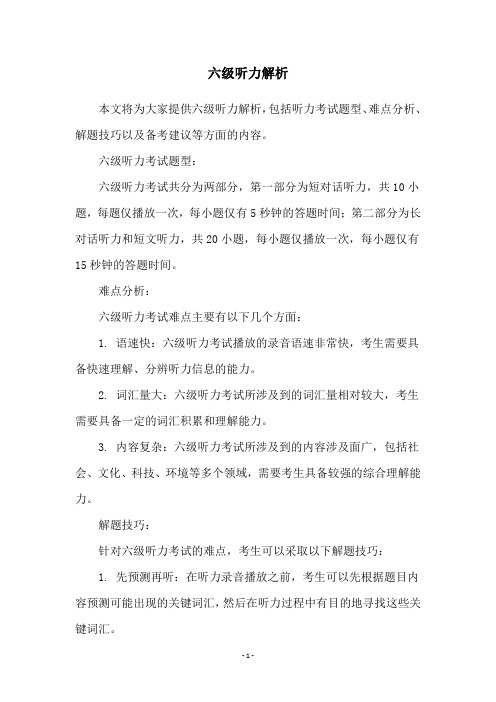
六级听力解析本文将为大家提供六级听力解析,包括听力考试题型、难点分析、解题技巧以及备考建议等方面的内容。
六级听力考试题型:六级听力考试共分为两部分,第一部分为短对话听力,共10小题,每题仅播放一次,每小题仅有5秒钟的答题时间;第二部分为长对话听力和短文听力,共20小题,每小题仅播放一次,每小题仅有15秒钟的答题时间。
难点分析:六级听力考试难点主要有以下几个方面:1. 语速快:六级听力考试播放的录音语速非常快,考生需要具备快速理解、分辨听力信息的能力。
2. 词汇量大:六级听力考试所涉及到的词汇量相对较大,考生需要具备一定的词汇积累和理解能力。
3. 内容复杂:六级听力考试所涉及到的内容涉及面广,包括社会、文化、科技、环境等多个领域,需要考生具备较强的综合理解能力。
解题技巧:针对六级听力考试的难点,考生可以采取以下解题技巧:1. 先预测再听:在听力录音播放之前,考生可以先根据题目内容预测可能出现的关键词汇,然后在听力过程中有目的地寻找这些关键词汇。
2. 分清主次:在听力过程中,考生要注意区分主要信息和次要信息,将注意力集中在主要信息上。
3. 标记关键词:考生可以在听力过程中用笔标记出现的关键词汇,便于后续查找和理解。
备考建议:针对六级听力考试,考生可以采取以下备考建议:1. 多听听力材料:考生可以选择一些六级听力材料进行听力练习,提高自己的听力水平。
2. 提高词汇量:考生可以多背单词、多阅读英文原著等方式扩充自己的词汇量。
3. 多练习模拟题:考生可以多练习一些模拟题,熟悉六级听力考试的题型和难度,提高自己的考试技巧。
以上就是本文为大家提供的六级听力解析,希望能够对大家备考六级听力考试有所帮助。
六级听力分布题型
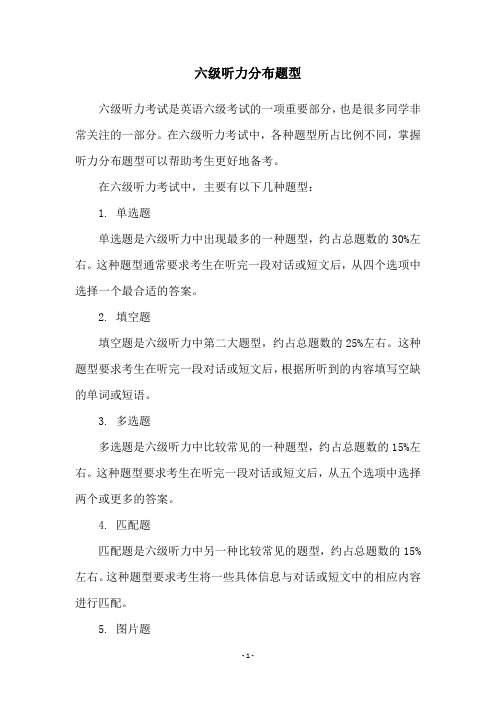
六级听力分布题型
六级听力考试是英语六级考试的一项重要部分,也是很多同学非常关注的一部分。
在六级听力考试中,各种题型所占比例不同,掌握听力分布题型可以帮助考生更好地备考。
在六级听力考试中,主要有以下几种题型:
1. 单选题
单选题是六级听力中出现最多的一种题型,约占总题数的30%左右。
这种题型通常要求考生在听完一段对话或短文后,从四个选项中选择一个最合适的答案。
2. 填空题
填空题是六级听力中第二大题型,约占总题数的25%左右。
这种题型要求考生在听完一段对话或短文后,根据所听到的内容填写空缺的单词或短语。
3. 多选题
多选题是六级听力中比较常见的一种题型,约占总题数的15%左右。
这种题型要求考生在听完一段对话或短文后,从五个选项中选择两个或更多的答案。
4. 匹配题
匹配题是六级听力中另一种比较常见的题型,约占总题数的15%左右。
这种题型要求考生将一些具体信息与对话或短文中的相应内容进行匹配。
5. 图片题
图片题是六级听力中比较少见的一种题型,约占总题数的5%左右。
这种题型要求考生根据所听到的内容选择与图片相应的选项。
6. 判断题
判断题是六级听力中最少见的一种题型,约占总题数的5%左右。
这种题型要求考生在听完一段对话或短文后判断所听到的陈述是正确、错误还是没有提及。
综上,六级听力中题型分布比较平均,考生在备考时需要全面掌握各种题型的做题技巧,提高做题效率。
六级听力--长对话部分
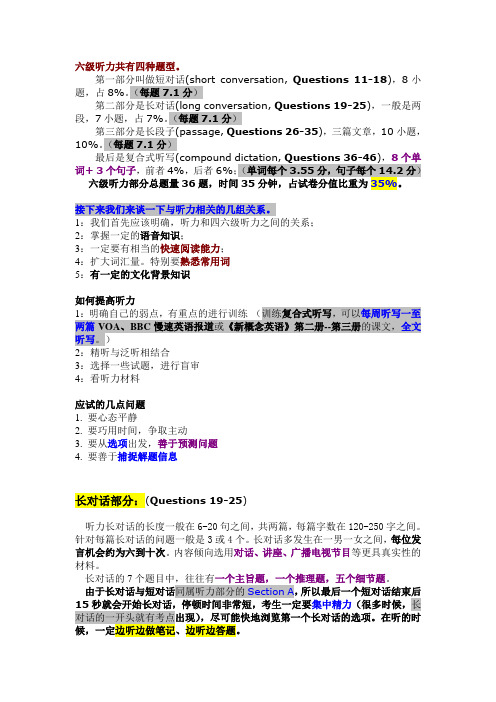
六级听力共有四种题型。
第一部分叫做短对话(short conversation, Questions 11-18),8小题,占8%。
(每题7.1分)第二部分是长对话(long conversation, Questions 19-25),一般是两段,7小题,占7%。
(每题7.1分)第三部分是长段子(passage, Questions 26-35),三篇文章,10小题,10%。
(每题7.1分)最后是复合式听写(compound dictation, Questions 36-46),8个单词+ 3个句子,前者4%,后者6%;(单词每个3.55分,句子每个14.2分)六级听力部分总题量36题,时间35分钟,占试卷分值比重为35%。
接下来我们来谈一下与听力相关的几组关系。
1:我们首先应该明确,听力和四六级听力之间的关系;2:掌握一定的语音知识;3:一定要有相当的快速阅读能力;4:扩大词汇量。
特别要熟悉常用词5:有一定的文化背景知识如何提高听力1:明确自己的弱点,有重点的进行训练(训练复合式听写,可以每周听写一至两篇VOA、BBC慢速英语报道或《新概念英语》第二册--第三册的课文,全文听写。
)2:精听与泛听相结合3:选择一些试题,进行盲审4:看听力材料应试的几点问题1. 要心态平静2. 要巧用时间,争取主动3. 要从选项出发,善于预测问题4. 要善于捕捉解题信息长对话部分:(Questions 19-25)听力长对话的长度一般在6-20句之间,共两篇,每篇字数在120-250字之间。
针对每篇长对话的问题一般是3或4个。
长对话多发生在一男一女之间,每位发言机会约为六到十次。
内容倾向选用对话、讲座、广播电视节目等更具真实性的材料。
长对话的7个题目中,往往有一个主旨题,一个推理题,五个细节题。
由于长对话与短对话同属听力部分的Section A,所以最后一个短对话结束后15秒就会开始长对话,停顿时间非常短,考生一定要集中精力(很多时候,长对话的一开头就有考点出现),尽可能快地浏览第一个长对话的选项。
- 1、下载文档前请自行甄别文档内容的完整性,平台不提供额外的编辑、内容补充、找答案等附加服务。
- 2、"仅部分预览"的文档,不可在线预览部分如存在完整性等问题,可反馈申请退款(可完整预览的文档不适用该条件!)。
- 3、如文档侵犯您的权益,请联系客服反馈,我们会尽快为您处理(人工客服工作时间:9:00-18:30)。
大学英语六级听力常见的题型
大学英语六级听力常见的题型
1、小故事题型
主要类型:幽默故事、奇闻轶事三个考点:
(1)首三句:交待故事背景以及主人公遇到什么问题
(2)主人公做出了什么样的计划决定以及原因
(3)故事往往会以非常生动的结局收尾,通常主人公做了出人意料的举动或说了意味深长的话,然后要推测其言外之意
2、名人段落题
考过的名人:政治家、总统、艺术家、商人、作家、运动员、球星、科学家、教师三个考点:
(1)开篇句会对某个人物进行简介,有时候会给出生和死亡年代
(2)名人他做过的.著名的大事
(3)名人的历史地位评价
3、学校教育体制题
考过的类型:美国中小学、私立学校(privateschool)、公立学校(publicschool)、宗教学校(religionschool)、美国某学校特殊的教育体制方法三个考点:
(1)开篇句会对学校进行简介以及提出基本问题
(2)经常会出现师资、生源、宿舍、图书馆、课外活动、办学力量、逃学旷课等等相关的介绍(经常出现数字题)
(3)学校的解决办法以及独特的方面
4、特殊机构以及西方文化介绍题
特殊机构类:银行、餐厅、法庭、监狱、图书馆、市政设施、政府当局等等三个考点:
(1)开篇句会对某种机构进行简介,有时会带出所在地点、国家等等
(2)机构的运作方式
(3)它给特殊群体带来了什么样的便利,有时会有些评价
文化类:好莱坞电影、芭蕾舞、音乐剧以及一些文化特色三个考点:
(1)开篇句会对其进行简介
(2)人们选择它的原因,它的独特之处
(3)它的创作人员以及创作原因
5、日常生活题
主要类型:
(1)说明文:汽车、电脑、服装、餐饮、书籍、宠物、旅游休闲等等三个考点:
①开篇句会对其进行简介
②它的独特之处以及人们选择它的原因
③它的未来趋势和变化
(2)议论文:辍学、代沟、上网、女权主义、健身运动等等三个考点:
①提出论点
②正反两方的论点
③总结
6、灾难危机题型
六大类:环境污染;资源短缺;人口增长;交通问题;犯罪现象;吸毒、离婚、自杀等现象三个考点:
(1)开篇句会提出一个社会热点问题,分析现象特点以及形成原因
(2)它的危害之处
(3)人们的解决办法
7、调查研究题型
主要类型:国外某个大学或研究机构进行的某项特殊的调查试验研究四个考点:
(1)开篇句会以一个日常生活事实来引出话题
(2)步骤、目的、结果,会出现数据比较
(3)对结果进行分析并得出相关推论
(4)有时会出现专家的意见
8、新闻
考查类型:一般是不好的事情考点:
(1)自我介绍
(2)介绍事情的起因、经过
(3)当局正在采取什么措施。
